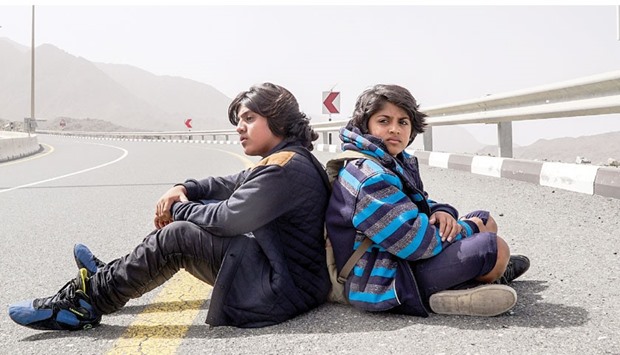
A still from Going to Heaven.
Following the Eid break, Doha Film Institute’s (DFI) Hekayat Khaleejiya series, which translates to ‘Stories from the Gulf’, is all geared up to return to wow film aficionados of Qatar with the screening of well-received Emirati film Sayer al Janah or Going to Heaven.
Dedicated to showcasing cinematic voices from the Gulf region, the quarterly Hekayat Khaleejiya series helps deconstruct the filmmakers’ idea and creative vision by throwing open a discussion after the screenings and also provides an important glimpse into the variety of emerging filmmaking talents in the Gulf. The award-winning film Going to Heaven will be screened at the Museum of Islamic Art auditorium at 7.30pm on August 4 and 5 — tickets are available on the DFI website.
Filmmaker Saeed Salmeen al-Murry’s 90-minute road trip drama has been winning praise ever since its world premiere at the Dubai International Film Festival last year, where it picked up the Muhr Emirati Award for Best Feature Film. “From Abu Dhabi to Fujairah, young Sultan sets off on an extraordinary journey as he seeks out his grandmother,” reads the film’s synopsis, “Sultan, who has dreamt of the warmth of her love, is determined to reunite with an absent grandmother so that he can escape the bitterness of life. Accompanied by his friend Saud, Sultan’s trip will unravel surprises and exuberant emotions.”
Going to Heaven, which was recently released in theatres across the UAE, has been filmed entirely in the UAE, presenting movie-lovers an opportunity to see Abu Dhabi, Sharjah, Fujairah and Dubai on the big screen, through the eyes of an Emirati director. It happened to be the third UAE film to reach cinemas this year, following the release in January of Majid al-Ansari’s critically acclaimed Zinzana, and in April of De Fhay Abu Dhabi.
Starring two first-time Emirati actors who are brothers in real life – Ahmed Ibrahim al-Zaabi (14) and Jumma Ibrahim al-Zaabi (12) – the film brings to light an integral aspect of the Emirati family dynamic, “the ties between young and older members of the family,” against the fabulous landscape of the UAE.
In an interview with the website StepFeed, al-Murry had said that the biggest inspiration for the film was from the heart of UAE society and the Gulf. “I am especially passionate about our culture so it made it a lot easier to write the script. The film shows the traditions of an Emirati household including the role of the grandparents, a rare sight as they do not often leave the home. It also shows the spirit and resilience of the Emirati people through Sultan’s courage and persistence to find his grandmother at any length,” al-Murry pointed out.
Interestingly, Going to Heaven attempts a contemporary approach as it centres on the “loss of traditional communication and human interaction in favour of new technology.” As al-Murry said, “The film highlights a challenge we are facing in the community, which is a lack of human interaction between family members. The control of technology on our lives is becoming so apparent, from smartphones to social media… I felt like it was important to tell this story.”
“Going to Heaven is not your typical road movie… but you will get a rare look at the everyday life of ordinary Emiratis, and a touching tribute to grandmothers,” Empire Arabia pointed out in its review of the film, “Told from the vantage point of a young boy, it offers a new perspective on the Emirati story.”
Al-Murry graduated from the New York Film Academy in Abu Dhabi, and has won awards for the short film Huboob (2006) at the Emirates Film Competition (EFC) and the Dubai International Film Festival. He continued this success with the short Al Ghobna (2007), which won award at the EFC and was screened at Dubai. His short film Bint Mariam (2008) won more than 13 awards internationally.
His first feature film Sun Dress (2010) was screened at the Abu Dhabi Film Festival and won the Special Jury Award in the Muscat International Film Festival. While Sun Dress addressed local prejudices against those with disabilities, Going to Heaven expands the scope to bring out a universal tale about family without succumbing to the tropes of formula drama.
